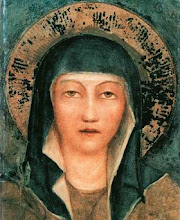ST. SCHOLASTICA: An Early Saint of Modern Relevance

We do know that Scholastica was the twin sister of St. Benedict, and that she grew up in a wealthy noble family. Just like her brother Benedict, she felt God calling her to the contemplative life and founded the first women’s monastic community in Western Europe. Even though she never left behind any writings, she must have been a woman of great insight and love in order to realize the great good that women can do who give their entire lives to be in union with Christ in a life of prayer and penance.
Scholastica is a Saint who is particularly relevant to laypeople today as well. For men and women out in the workforce, “work-life balance” is a term that may be a bit overused but a concept that is definitely a reality. For Christians, our desires to maintain a steady prayer life can often seem like its throwing an extra ball into the “juggling act” of our already busy schedules. Today we might call it “work life balance,” or “time management,” but Scholastica and her brother Benedict called it “Ora et Labora” (prayer and work). The idea was to arrange a work/prayer schedule throughout the day so that the members of their communities could work in a productive and prayerful manner without feeling that they were being overworked and so that they could pray regularly and not become “burnt out” on prayer, as can sometimes happen when you don’t schedule time to do non-prayer activities. Since women in particular are naturally persevering and participatory, I think that Scholastica understood how the “Ora et Labora” system would be good for her sisters by helping them to maintain a healthy balance in their spiritual lives.
We only have one anecdote from the life of St. Scholastica, about an incident from when she met with her brother Benedict shortly before her death. You can read about it here from one of my past blogposts. One of the virtues that Scholastica displays in this little story is not only her childlike faith in God but also the way she made time for her family and made visiting with him a top priority. Despite the violent storm going on outside, she simply wanted to spend time with her beloved brother. Perhaps Scholastica’s intercession can help us find the strength to love and devote time to our families despite the emotional and situational storms that might be raging in our lives.
That's about all that we know about St. Scholastica. In spite of the little information we have of her, she is nonetheless a beautiful Saint whose intercession has been very powerful in my own spiritual life. I’d like to close with a quote from St. Therese’s Story of a Soul which, although not specifically written about St. Scholastica, could certainly be applied in her case:
O Mother, how different are the ways through which the Lord leads souls! In the lifes of the Saints, we find many of them who didn’t want to leave any of themselves behind after their death, not the smallest souvenir, not the least bit of writing. On the contrary, there are others….who have enriched the Church with their lofty revelations, having no fears of revealing the secrets of the King in order that they may make Him more loved and known by souls. Which of these two types of Saints is more pleasing to God? It seems to me, Mother, they are equally pleasing to Him, since all of them followed the inspiration of the Holy Spirit and since the Lord has said, “Tell the just man ALL is well.”
HAPPY ST. SCHOLASTICA DAY, EVERYONE!









1 Comments:
Hello,
After your kinds words about my entry on St. Scholastica, I thought to come here to yours and at least read your entry.
I am edified! Saints appeal to us for many reasons. A prayer I like to say is, "All you angels and saints who love me..." and then make the petition.
Post a Comment
<< Home